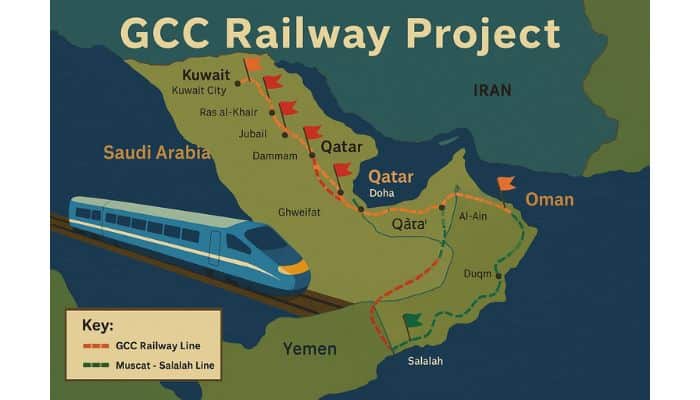The GCC Railway Project is set to transform transportation across the Gulf. This ambitious railway will link all six Gulf Cooperation Council (GCC) nations: Kuwait, Saudi Arabia, Bahrain, Qatar, the UAE, and Oman, creating a new era of regional connectivity and economic integration.
Quick Facts
| Feature | Details |
|---|---|
| Total Length | 2,117 km |
| Start Point | Kuwait |
| End Point | Oman |
| Countries Connected | Kuwait, Saudi Arabia, Bahrain, Qatar, UAE, Oman |
| Estimated Cost | $250 billion |
| Scheduled Completion | 2030 |
| Global Ranking | 3rd largest mega project (Statista) |
What Makes the GCC Railway Project Special?
- Stronger Regional Ties: The railway will facilitate the smooth movement of people and goods between all six Gulf countries, making travel and trade faster and easier.
- Economic Growth: Improved logistics will reduce transportation costs, enhance trade, generate employment opportunities, and attract tourism across the region.
- Sustainable Travel: The project provides an eco-friendly alternative to cars and planes, helping to reduce carbon emissions and support green goals.
Route and Connectivity
- The railway starts in Kuwait and ends in Oman.
- It will pass through Saudi Arabia, with links to Bahrain and Qatar, then continue through the UAE before reaching Oman.
- Major cities, industrial zones, and ports will connect, fueling both business and tourism.
Timeline and Progress
- The idea took shape in the early 2000s.
- Each country is building its section, with efforts underway to align technical standards and timelines.
- The whole network is expected to be operational by 2030, although construction progress varies.
Why the GCC Railway Matters
- Economic Diversification: The railway helps Gulf countries move beyond oil by strengthening other sectors.
- Better Mobility: It will provide a fast, reliable, and safe transportation option for individuals and businesses.
- Regional Unity: By physically connecting the Gulf, the project strengthens cooperation and shared economic goals.
Challenges Ahead
- Cross-border Coordination: Aligning regulations, safety standards, and timelines across six countries is a complex task.
- Cost: With an estimated price tag of $250 billion, financing remains a significant challenge.
- Political Dynamics: Ensuring stable cooperation across the region is essential for success.
Final Thoughts
The GCC Railway Project is more than just tracks and trains. It’s a bold step toward a more connected, diversified, and sustainable Gulf. With completion set for 2030, it stands among the most significant infrastructure projects on the planet, promising to reshape the future of travel and trade in the Middle East.

I’m Soha Owais, a law graduate with an LLB (Hons), blending my legal background with a passion for storytelling. As an author and writer at Saudiscoop.com, I craft engaging narratives that connect with both local and international audiences, bringing a fresh and informed perspective to the stories that matter.




